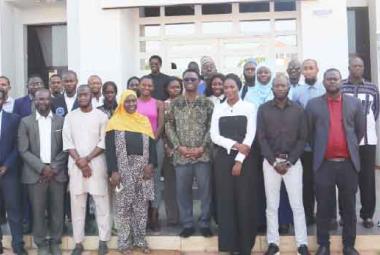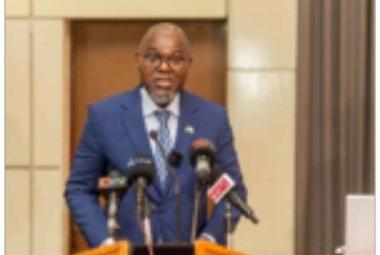By Kumba Leigh
The Gambia last week joined the rest of the world to commemorate World Population Day, marked on July 11th each year. This year’s commemoration is on the theme, “Embracing the power of inclusive data towards a resilient and equitable future for all’. The day is set aside globally to raise awareness on emerging population and development-related issues.
Speaking on the occasion at an event held at the SDKJ International Centre, the Director of National Population Commission Secretariat (NPCS) Mrs Mariama Fanneh, said that the celebration of World Population Day serves not only as an occasion to commemorate World Population Day and launching of the State of World Population Report, but also provides a platform for a resounding call to action that demands their collective attention and commitment.
She spoke about the importance of data, saying inclusive data guides targeted interventions towards sustainable development by ensuring that every individual, regardless of background, is seen, heard, and valued. “Particularly, it empowers us to address inequalities, bridge gaps, and make informed decisions that foster resilience and equity,” she added.
She noted that The Gambia and the global community is confronted with multifaceted challenges, ranging from demographic shifts and economic disparities to technological advancements, climate change, and health crises, thus the demand for accurate and comprehensive data has never been more crucial.
NPCS Director Fanneh urged The Gambia government, international partners, civil society, the private sector, and other stakeholders to champion the cause of inclusive data, through committing to investing in robust data systems that encompass the full spectrum of the society, and ensuring that development strategies are firmly rooted in the realities of the people.
Statistician General, Gambia Bureau of Statistics, Nyakassi M.B Sanyang, referenced that since its declaration in 1989, World Population Day has highlighted the urgency of population issues, noting the observation of the day has continued since July 1990 to raise awareness of population impacts on the environment and development, including socio-economic development, environmental sustainability, and individual well-being.
Mr Sanyang further made reference to the 30-year-old International Conference on Population and Development (ICPD), held in Cairo, where 179 governments gathered to commit to a Programme of Action (PoA). He said the ICPD PoA revolutionised how the relationships between population, poverty reduction, and development were addressed by putting human rights, needs, and aspirations at the center of sustainable development.
“At this conference, the 179 countries including The Gambia committed to working toward attaining universal access to sexual and reproductive health for all by 2015, reduce infant and under-5 mortality rates to below 35 and 45 per 1,000 live births, respectively, as well as a 75% decrease in maternal mortality rates,” He alluded
He explained that in 2010, the UN General Assembly extended this promise beyond the 20-year time-frame given in the ICPD PoA in order to “fully meet its goals and objectives”, noting that at the 25thanniversary of the International Conference on Population and Development (ICPD+25) held in Kenya, governments and international partners including the government of The Gambia adopted the Nairobi Summit Declaration, which reaffirmed the commitments made at the original ICPD held in Cairo and set new targets for the next decade in areas such as ending all preventable maternal deaths, unmet need for family planning and gender-based violence and harmful practices towards women by 2030.
Mr Sanyang asserted that The Gambia endeavours to achieve its national development agenda (RF-NDP), AU Agenda 2063 and the SDGs. He underscored the need for data to take center stage, as accurate, reliable, and timely data is the life force of informed decision-making, effective problem-solving and sustainable progress. He said over the last few decades, improvements in data collection, analysis, and technology have improved quality and availability of more comprehensive and timely information, enabling Gambia to measure and achieve goals related to good health and the fulfillment of rights and choices.
Karl-Frederick Paul, United Nations Residence Coordinator The Gambia, pointed out that for The Gambia to continue progressing and achieving the SDGs, it is essential to count and recognise every individual, no matter their location or identity.
He assured that the UN in The Gambia is readily available to support The Gambia Government realise the goals of the Green Recovery-Focused National Development Plan, especially in strengthening the health systems, improving gender equality and women’s empowerment, and protecting the rights and well-being of people especially those left behind as outlined in outcome 2.2 of the UN Sustainable Development Cooperation Framework, which centers around human development, social inclusion, and people-centered governance.
Mr Karl-Frederick Paul highlighted that in 40 percent of countries with data, women’s bodily autonomy is diminishing, stressing that women with disabilities are up to ten times more likely to experience gender-based violence than their peers without disabilities. He added that access to contraceptives, safe birth services, respectful maternity care, and other essential sexual and reproductive health services remains unreachable for too many women and girls; gender-unequal norms are embedded in healthcare infrastructure, including persistent underinvestment in the world’s largely female midwifery workforce.
He called on all stakeholders – government agencies, civil society organisations, and development partners to take concrete actions to strengthening our data collection systems, especially in hard-to-reach areas, investing in healthcare infrastructure, particularly in rural regions, empowering women and girls through education and economic opportunities, and promoting inclusive policies that address the needs of marginalized communities.
Other speakers including Salimata E.T Touray, Secretary General and Head of Civil Service, Ndey Rose Sarr, of UNFPA, who both expressed similar sentiments.







